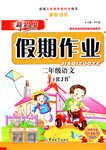题目内容
Rescue workers found a family in their RV on Tuesday after 17 days in the mountains near the
Peter Stivers, Marlo Hill-Stivers, their two children Sabastyan, 9, and Gabrayell, 8, and Hill-Stivers’s mother and stepfather, Elbert and Becky Higginbotham, were in the vehicle. On their way home from a trip to the coast, the family got lost in the mountains at an elevation (高地) of about 3,800 feet. What’s worse, they were trapped in four feet of snow.
“We had fuel and food, but we were running short,” said Elbert Higginbotham. “We were rationing (定量配给).”
When the family was reported missing, rescue teams from Oregon and
In the evenings, Sabastyan and Gabrayell entertained the adults by reading jokes from Reader’s Digest aloud. The family members survived mostly on dehydrated food(脱水食物) .
On Monday, Hill-Stivers and her husband decided to go for help. They packed a tent, wool blankets, tuna fish, honey, and hand-warmers to take into the wilderness with them. The children stayed safe in the RV with their grandparents.
The couple were found the following day by a US Bureau of Land Management worker. A rescue team in a helicopter located the rest of the family. The family was driven out of the snowbound (被雪封住的) area on snow machines. Parents and children were happily reunited.
“They enjoyed it,” Peter Stivers said of his children’s experience. “They didn’t know we were in trouble.” For the adults, it was quite an ordeal (严酷的考验). They had to worry about survival and rescue, and about keeping everyone calm. “I’m so proud of my family,” said Elbert Higginbotham. “They stuck together, they didn’t lose it.”
60. What is the main cause of the family’s bad situation?
A. They ran short of fuel. B. It snowed heavily.
C. They couldn’t find their way. D. Their RV couldn’t move in the snow.
61. Which of the following can NOT be learned from the passage?
A. Rescue teams finally failed for lack of necessary clues.
B. The children felt no fear when the family were trapped.
C. On Tuesday, the couple were found by a rescue worker.
D. The adults had a good performance in face of trouble.
62. If there is a good lesson from the story, it can be ______.
A. travel in the mountains should be avoided
B. when traveling, people should keep in touch with rescue teams
C. children can cause much trouble in travel
D. people should know how to save themselves when facing trouble.
63. This passage is probably chosen from a newspaper’s column of ________ .
A. Education B. News C. Health D. Economy

 新思维寒假作业系列答案
新思维寒假作业系列答案Dear, Michelle, | |||
I’m very exciting! Today is my first day at a new school in | 76. | ||
The school I study at is a government school . Although I’m new to my | 77. | ||
classmates, the teacher asks me to introduce me to them in class. I tell them | 78. | ||
I come from Hong Kong and I like to play with computer games, listen to | 79. | ||
music and do sports in my spare time. I also like the | 80. | ||
81. | |||
public library and museums in | 82. | ||
which I live, there is a huge park. Around my house, there is plenty of space. | 83. | ||
Michelle, I miss you very much. I’ll never forget the days we spend | 84. | ||
together and the fun we shared with all our old classmates. | 85. | ||
Best wishes. | |||
| |||
Josphine |